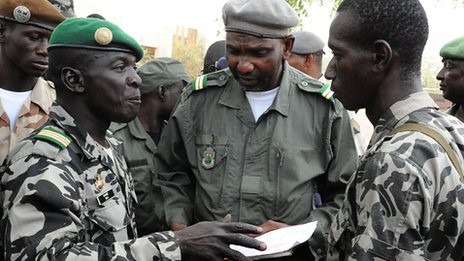
Soldiers in the West African state of Mali have staged a coup due to the failure of the Bamako government to handle a burgeoning rebellion in the north of the country. The coupmakers may be backed by the imperialist states led by the US., a photo by Pan-African News Wire File Photos on Flickr.
Mali junta facing increased pressure to relinquish power
Mali's junta was facing increasing pressure to give up power on Wednesday, with world powers tightening the diplomatic screws as Islamists consolidate their grip on the north.
6:14AM BST 04 Apr 2012
UN Security Council members were hammering out a joint statement on the Mali crisis, with agreement expected later Wednesday on a strong message but without any firm actions proposed.
France called the emergency discussions of the 15-nation council to negotiate a statement condemning last month's coup against President Amadou Toumani Toure and the advance of Tuareg rebels and Islamist militants into towns in the north of the country.
The United States took action on Tuesday, joining the African Union in imposing travel bans on coup leaders as international efforts were redoubled to restore democratic rule in a country descending into chaos.
The US State Department said it would restrict travel to the United States of those "who block Mali's return to civilian rule and a democratically elected government, including those who actively support Captain Amadou Sanogo," the coup leader.
Feeling the bite of the mounting sanctions and pressure from all sides, the soldiers who seized power on March 22 proposed a national meeting on Thursday and dispatched a team to Nigeria for talks on an exit from the growing crisis.
Sanogo told journalists that Thursday's meeting would determine "what will be best for the country in a consensual, democratic fashion."
Since the coup, ostensibly over the government's failure to stamp out a northern rebellion, the junta has lost more than half the country's territory – an area the size of France – in a matter of days to the rebel juggernaut.
Islamists seized control of the ancient trading hub Timbuktu over the weekend alongside Tuareg rebels and have since chased out their allies and declared to residents and religious leaders that they were imposing sharia law.
This sparked alarm abroad ahead of the emergency UN Security Council meeting, with former colonial power France expressing concern over the Islamist threat in a country considered a democratic success until the coup.
The Tuareg rebels want an independent state while Ansar Dine, under notorious Commander Iyad Ag Ghaly, wants to impose Islamic law and has linked up with al-Qaeda in the Islamic Maghreb (AQIM).
Three of the four leaders of al-Qaeda's north Africa branch, Abou Zeid, Mokhtar Belmokhtar and Yahya Abou Al-Hammam, were in Timbuktu on Tuesday, security and religious sources in the city said.
Residents reported women in the normally secular city that hosted a major music festival in January were on Tuesday wearing headscarves.
A day after being slapped with sanctions by its neighbours, Mali's embattled military rulers came under travel bans and an asset freeze from the African Union for failing to restore constitutional order, before the US imposed its own travel ban, which will also apply to immediate family members of the coup leaders.
The 15-nation Economic Community of West African States (ECOWAS) already cut off the landlocked country which depends heavily on imported fuel, also freezing access to its bank account in Dakar.
In Bamako, long lines formed at petrol stations as panic set in over the impact of the sanctions.
"We hear there is an embargo, we are afraid of shortages so we are taking precautions," said a youth who wanted to fill half a dozen empty bottles.
The junta on Tuesday sent a delegation to Nigeria, where ECOWAS officials could offer an amnesty in exchange for relinquishing power, a foreign ministry source in Abuja said. However, it appeared a deal was not reached.
Coup leader Sanogo said in Bamako the junta wanted to prosecute ousted President Toure for "high treason and financial wrongdoing."
As the junta struggled with the intensifying crisis, armed Islamists in the north handed out food and supplies that they seized from humanitarian organisations to residents of Timbuktu, sources said.
Officials from the regional food security office linked to the agriculture ministry and local Red Cross confirmed that the goods being distributed were forcibly taken from their stocks.
The fighting in northern Mali began in mid-January by the Azawad National Liberation Movement (MNLA), which wants independence for its homeland in the northern triangle of the bow-tie shaped nation.
A powerful player in northern Mali, Ag Ghaly and his fighters have placed their black jihadist flag around Timbuktu, which was a leading trading and intellectual capital up until the 16th century.
The UN cultural agency UNESCO called on the Malian authorities and the warring factions to respect the desert country's heritage and the "outstanding architectural wonders" in Timbuktu.
More than 200,000 people have been forced from their homes by the fighting and aid groups have warned that the combination of civil war and drought could lead to one of the continent's worst humanitarian emergencies.
Source: agencies
No comments:
Post a Comment